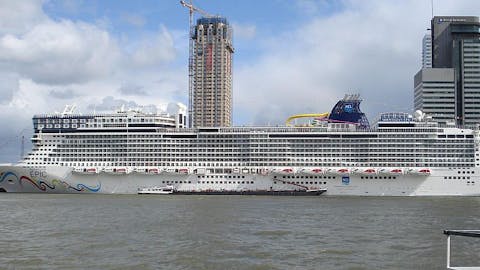Mark Kempa: Yes, Patrick, I think we’ll take some of those details offline on our post call. But what I can tell you is that we’ve been telegraphing that we expect our average fully diluted share count to be approximately about $470 million, which I think believe we have in our slide deck for a couple of calls now. And that assumes that the 2027 convertibles are converted in cash, which we’ve been saying from the get-go. But it really is just a reflection of where the convertibles, the 2024 and 2025 convertibles, which will be equitized. We do not have a choice there, but that is really just the accounting for it. So, on average, I would use about $460 million for the fully diluted share count for the year.
Patrick Scholes: Thank you. I’ll check out the slide deck on that. Thank you.
Operator: And the next question comes from the line of Fred Wightman with Wolfe Research. Please proceed with your question.
Fred Wightman: Hey guys. Thanks for the question. Can you just touch on the plans or changes to the premium class? It sounds like those are going to be a little bit bigger than the first few iterations. I know that you guys were excited about offering a smaller ship size initially when that was introduced. So, what exactly changed? Was it the cost, the guest experience, something else?
Harry Sommer: Yes. This is Harry Sommer. Listen, we were really excited about the performance of Prima. She’s come out of the gate is our best book ship, great yields, great onboard revenue, and most importantly, great — I guess, experience, excuse me, great satisfaction scores. When we looked at the platform now that it’s in operation, we think we can take that great guest experience, great financial performance and get slightly better economies of scale by driving the ships a little bit bigger, hence, the slight increase for Prima 3 and 4, which will be delivered in 2025 and 2026. The last two is really a combination, as Mark mentioned in the prepared comments, making them methanol ready, which we think is very important for our decarbonization goals over time.
We’re very excited about the technology. We work with a lot of different experts in the field to hold in on ethanol being the future for ships being built in the later part of the 2020s. But in addition to having to ship larger at the house, the methanol tanks, we’re able to get more scale on those as well, more passenger counts. So again, the key is to deliver a fantastic guest experience and see what we can do to leverage scale and become more decarbonized along the way.
Fred Wightman: Makes sense. And then just on the marketing spend that you guys had talked about for a while in the back half 2022, could you maybe give some qualitative feedback on whether that met your expectations? Did you get the pricing benefit that you had expected? Was the consumer feedback in line with sort of what you were hoping for when you earmark that spend or not?
Frank Del Rio: Our basic go-to-market philosophy as we market to fill, we don’t discount to fill throughout the pandemic period and coming out of the pandemic period. Being able to keep our industry-leading net per diems and yields was of utmost importance. We’ve seen what happened to others when the discounting goes too far, it takes years, if not decades to be able to climb back up that slippery hill. So, if marketing was the cost of maintaining our industry-leading yields and it was well worth it. And we turned the year in our best book position ever. Mean to be able to say that at the end of 2022, we were better booked than at any time in our history, given what this industry has just gone through, where the full fleet was not in operation until the mid-year is an incredible statement to make and at higher prices.





